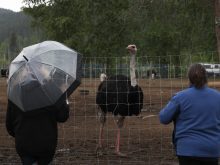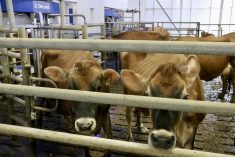Avian influenza has been confirmed at two sites in Quebec and another in Ontario, the Canadian Food Inspection Agency said Wednesday.
CFIA said it had quarantined two premises in Quebec after confirming an H5 type of avian flu in birds on a commercial poultry farm on Tuesday in the regional municipality (RCM) of Val-Saint-Francois, just north of Sherbrooke, and on a “non-commercial” farm in the neighbouring RCM of Haut-Saint-Francois on Wednesday.
CFIA hasn’t yet specified the strains of H5 flu in those cases, nor whether they were of high or low pathogenicity.
Read Also

Ample supplies and improved livestock sector to boost Canadian feed sector: FCC
Abundant feed grain supplies and improved profitability for the livestock sector should support strong feed demand and sales through the winter, says a new report from Farm Credit Canada.
The agency also said it had confirmed high-path H5N1 avian flu on Tuesday in another commercial poultry flock and imposed a quarantine at Markham, Ont., just north of Toronto, on Tuesday. Two other separate poultry flocks at Markham were confirmed with the virus last week.
The findings announced Wednesday bring the total appearances of avian flu in commercial Canadian poultry flocks so far this year to 21: 11 in southern Ontario, seven in central Alberta, two in western Nova Scotia and the one in Quebec’s Estrie region.
Details about the types and numbers of birds infected in any of the new cases weren’t immediately available Wednesday.
La terre de chez nous, the farm news arm of Quebec’s Union des producteurs agricoles, reported Wednesday that the commercial case in that province involves an H5N1 strain affecting a flock of domestic ducks at St-Claude, in the north of the Val-St-Francois RCM.
Of the same case, the Equipe quebecoise de controle des maladies avicoles (EQCMA), which monitors bird diseases in that province, had said separately Tuesday that a commercial farm in the St-Claude area was reporting “elevated mortality.”
CFIA continues setting up primary control zones (PCZs) surrounding infected premises, in which all movement of domestic birds and poultry products — whether in, out or through — is “strictly controlled” and requires CFIA permits.
As of Wednesday, 11 PCZs have been officially set up in southern Ontario and six in Alberta.
On top of the outbreaks in commercial flocks, officials in the past few months have also confirmed high-path avian flu in wild and/or non-commercial birds in all four Atlantic provinces, Quebec, Ontario, Saskatchewan and British Columbia. Quebec had confirmed a few cases of high-path H5N1 earlier this month in wild birds, one of them a Canada goose in the Estrie, at Granby.
CFIA said Wednesday it “continues to remind all those who raise poultry or own other disease-prone bird species to adopt good biosecurity practices to protect them from infectious animal diseases.”
To the south, the U.S. Department of Agriculture’s Animal and Plant Health Inspection Service (APHIS) since February has confirmed high-path avian flu in commercial poultry and/or backyard flocks in 26 states, including five states directly along the Canadian border.
As of Saturday, such cases have so far been found in Colorado, Connecticut, Delaware, Illinois, Indiana, Iowa, Kansas, Kentucky, Maine, Maryland, Massachusetts, Michigan, Minnesota, Missouri, Montana, Nebraska, New Hampshire, New York, North Carolina, North Dakota, Ohio, South Dakota, Texas, Virginia, Wisconsin and Wyoming. — Glacier FarmMedia Network

















